How to Choose a Telemedicine Software Development Company in 2026?
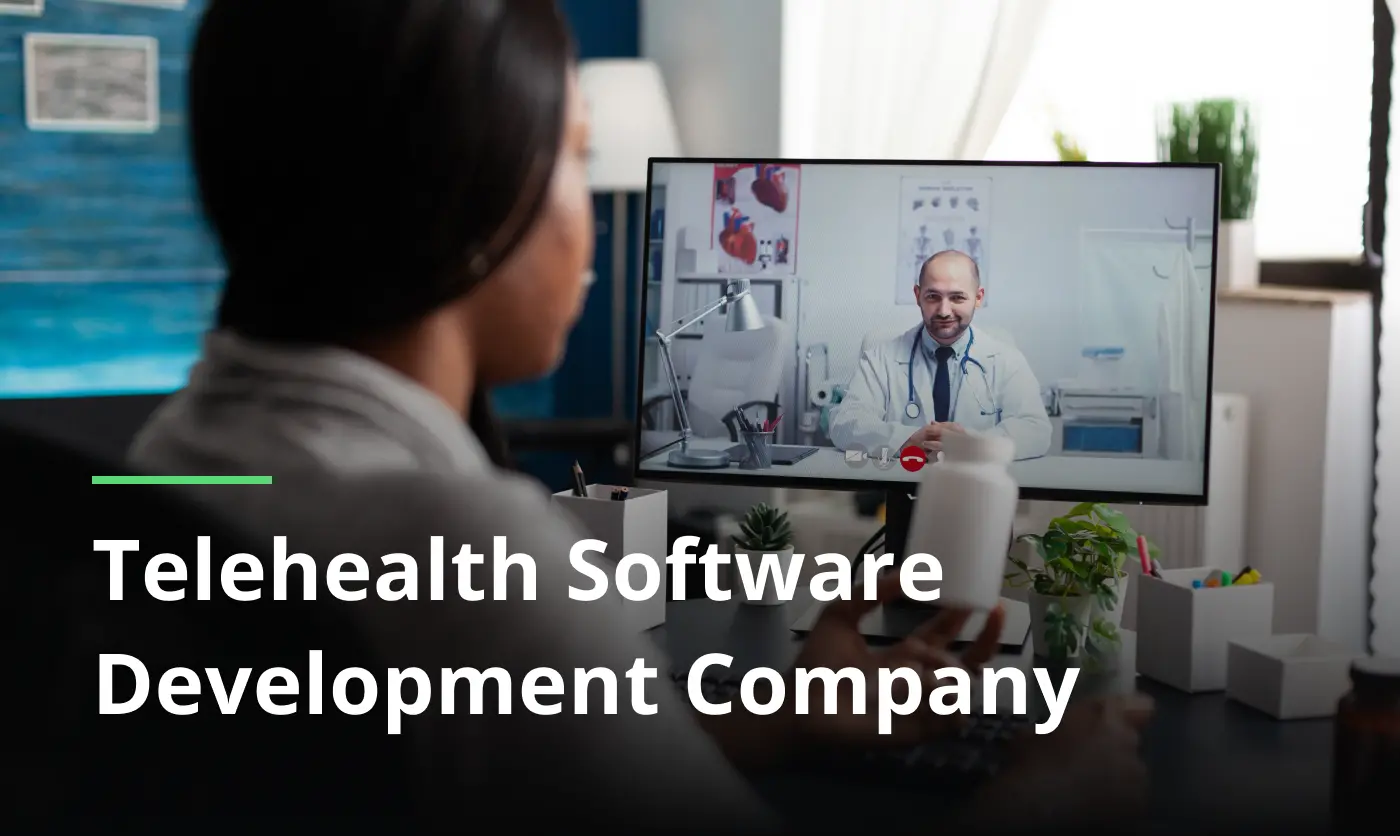
More than half of medical consultations in Europe will take place at virtual clinics and secure patient platforms. If you are looking for telemedicine software providers to start a collaboration and build reliable and compliant telehealth systems to help users maintain their physical or mental state, then you have come to the right place.
We will uncover what a telehealth software development company does and what criteria you should follow to choose the right option. You will see what different firms offer since this area of programming is a very complex thing and should be based on reliable practices and according to all the regulations, because it can directly affect the way people feel or even their lives.
Let us speed everything up in this guide and proceed with the complexities, but no worries, since we are going to put everything in the appropriate shelves regarding healthcare providers. By following our recommendations, you will end up working with the most prominent software development company in the UK, the US, or worldwide, offering the following services.
List of telemedicine software providers
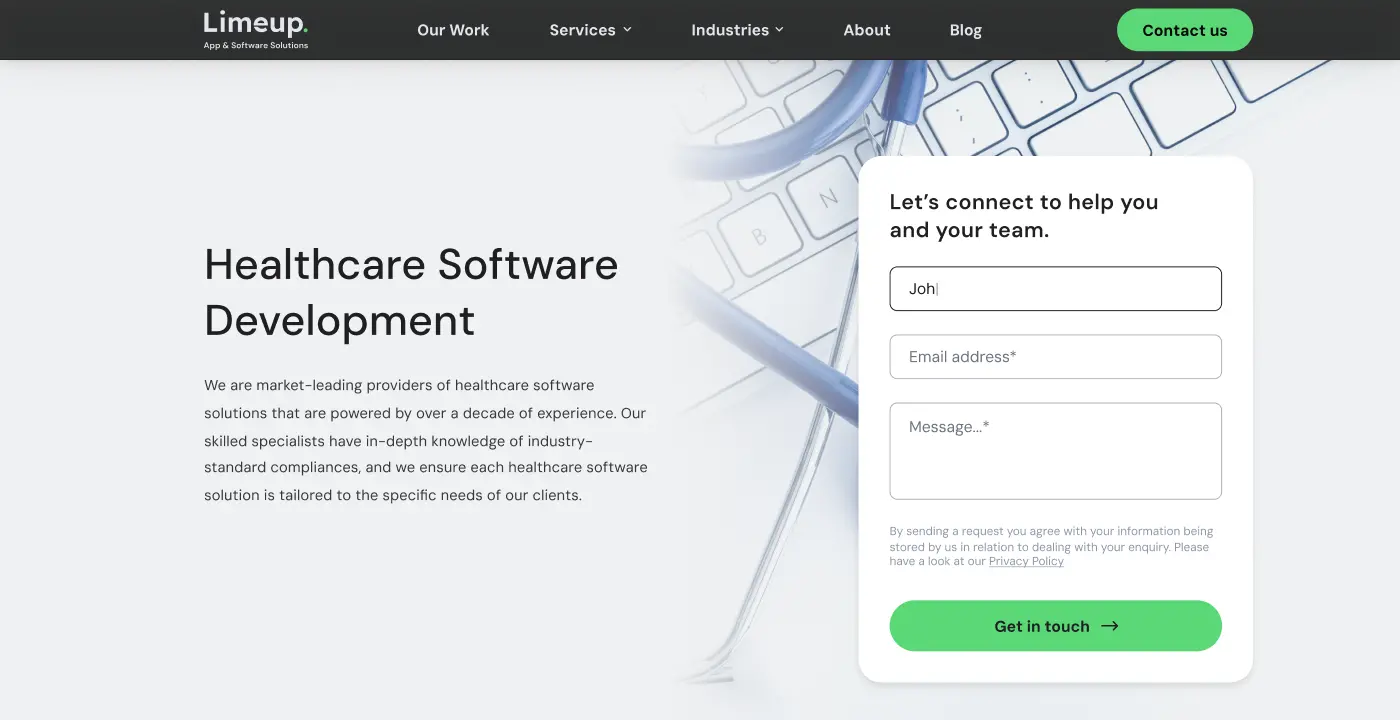
Founded: 2017
Headquarters: London, United Kingdom
Limeup created 200+ successful pieces of software, web and mobile applications to plug into various markets and has generated client revenue worth over $36M+. In our company, 75+ programmers are mid and senior-level professionals to keep all technological practices in check, which is why we have achieved such high results.
We have left our digital footprints in a lot of different telehealth software solutions. Revolutionary products made by us have not only scaled businesses but also transformed user experiences across complex, data-heavy ecosystems. Moreover, most of our partnerships with organizations last 5 years on average, showing our skills and proficiency.
Why choose us:
We provide a transparent client-first approach that guarantees delivery of genuinely customized hi-tech goods on time and within budget. We offer award-winning full-cycle design and development that creates full-functioning software with just the right design, technically appropriate and genuinely grounded with emotional resonance.
Select case studies:
- MedFlux is a telemedicine platform launched by Limeup in 16 weeks. Performing more than 1,500 video consultations on a daily basis, it registers a nearly 100% uptime and has AI-powered intake forms, slashing onboarding time by 60%.
- Raccoon.Recovery is a custom portal for healthcare that was created by us to simplify interactions through a smart design endowed with potent functionality. It stands to represent digital calling cards for our deep healthcare software expertise levels and the ability to build something that really takes pressure in the real world.
- Take a look at more of our success stories.
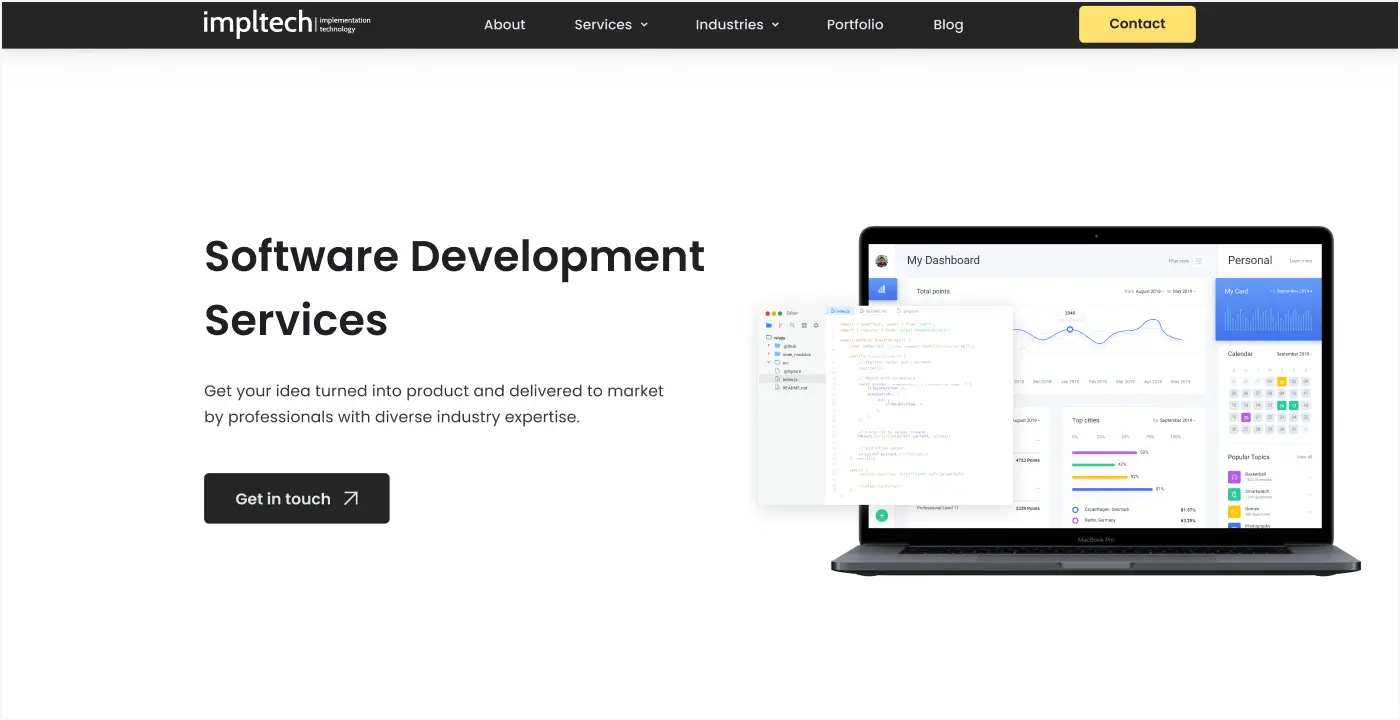
Founded: 2017
Headquarters: Berlin, Germany
impltech has consistently remained a leading telehealth development company. For almost 10 years of visible market presence and influence, they have received all the best rankings and testimony to their truly perfect code and distinguished technical bench.
Clients are always pleased with their unique blend of knowledge and battle-tested experience, which makes every product appear top-notch. impltech also places strong emphasis on regulatory compliance and data security, ensuring every telehealth solution meets strict industry standards while safeguarding sensitive patient information.
Key services:
Industries:
- Healthcare
- Pharmaceutical
- Real estate
- Fintech and more
Why choose them:
impltech is your choice if you are looking for someone to give it all for your digital product — from its inception, market fit, right through to long-term support. Also, they have always stood out for their rigorous reliance on data and, most impressively, an almost unheard-of client return rate of 95%, which practically speaks louder than words regarding impltech’s reliability.
Select case studies:
- impltech made an advanced pharmaceutical search platform for Apontis that filters through the medicament noise to enable search, identify and list medicines with extreme precision. The advanced-level filtering and photo-based identification techniques are like cogs working perfectly in this machine.
- The software for IndexPharm was set up over a span of six months and has more than fifty screens and dashboards, which help track stock-keeping, medicine availability and detailed information easily. It thereby enables doctors, pharmacists and retailers to be proactive in reordering and online sales.
- Familiarize yourself with more of their examples of work.
TechMagic

Founded: 2014
Headquarters: Kraków, Poland
TechMagic has now evolved into a full-cycle telemedicine software development firm with more than 300 personnel, offices distributed across Europe and the United States. Being in the position to serve Sony, Hilton and Deloitte, far from being unknown in business.
Key services: Custom software development, mobile app development, AI development, web development and design, enterprise app modernization.
Industries: Medical, financial services, media, information technology.
Why choose them:
Having an NPS score north of 92% with six partners cornering 40% of revenue on long engagements means they’ve got how to keep everything working and relationships flourishing. TechMagic is the company you need to meet if you are searching for a triple-threat official AWS partner capable of high scalability supported by cutting-edge technical precision.
Select case studies:
Their portfolio showcase in medical ventures involved making brain-mapping tools that explore the workings of cognition, such as a research platform to study mammalian brain function at Princeton University.
ELEKS
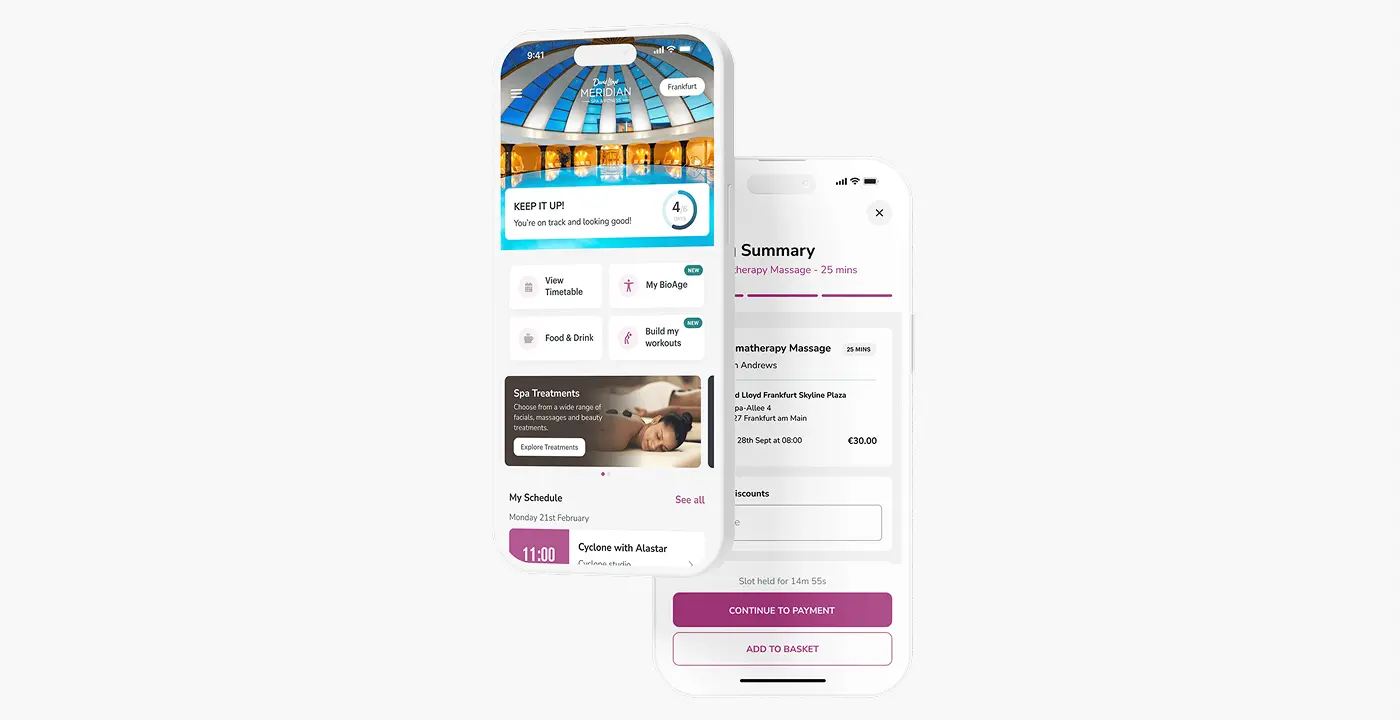
Founded: 1991
Headquarters: Tallinn, Estonia
Moving with the tides of innovation, ELEKS has offered telehealth development services like the creation of management systems, AI analytics and various helpful tools. With presence in 13 countries, they have been able to amass trust, promoting seamless collaboration on projects spanning multiple locations.
Key services: Custom software development, AI development, BI and Big Data consulting.
Industries: Medical, financial, supply chain, logistics and transport, energy and natural resources.
Why choose them:
ELEKS is esteemed for its reputation in delivering bulletproof systems with a 93–96% recommendation rate from clients. Their engagement models and global footprint make them a reliable candidate for lane transformation across borders.
Select case studies:
You can see exactly what they do by looking through their examples of work to decide whether they are a suitable partner for you and whether they have made something similar to what you want.
Binary Studio
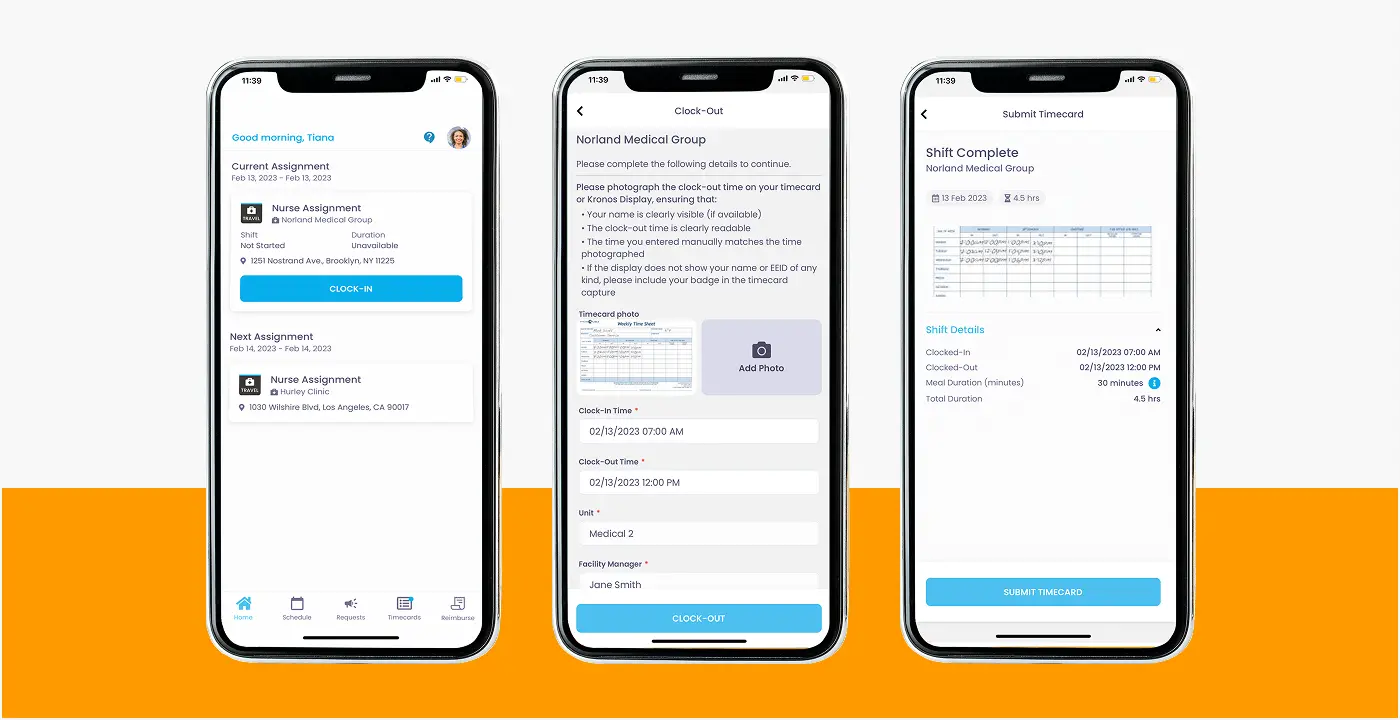
Founded: 2005
Headquarters: Lviv, Ukraine
Binary Studio operates one of Eastern Europe’s most competitive tech academies, with an acceptance rate finishing at less than 0.5%, an elite proving ground for engineering talent. This agency has lots of experience with telehealth software development services, all the way from mission-critical platforms to rocket-fueled startups throughout Europe and the US.
Key services: Custom software development, web development, mobile app development, ERP and CRM software development.
Industries: Healthcare, proptech, insurance, fintech, greentech.
Why choose them:
They create ironclad, long-haul partnerships built on technical precision and transparency, backed by their certifications in both Microsoft and MongoDB, which serve as a stamp of approval that underscores their reliability as a trusted partner.
Select case studies:
Binary Studio has delivered AI-driven diagnostic engines expected never to fail and a healthcare staffing app that grew from zero to enterprise status. Their success stories are on their corporate website, which certifies their deep understanding of the domain on which to build for the long term.
Serious Development
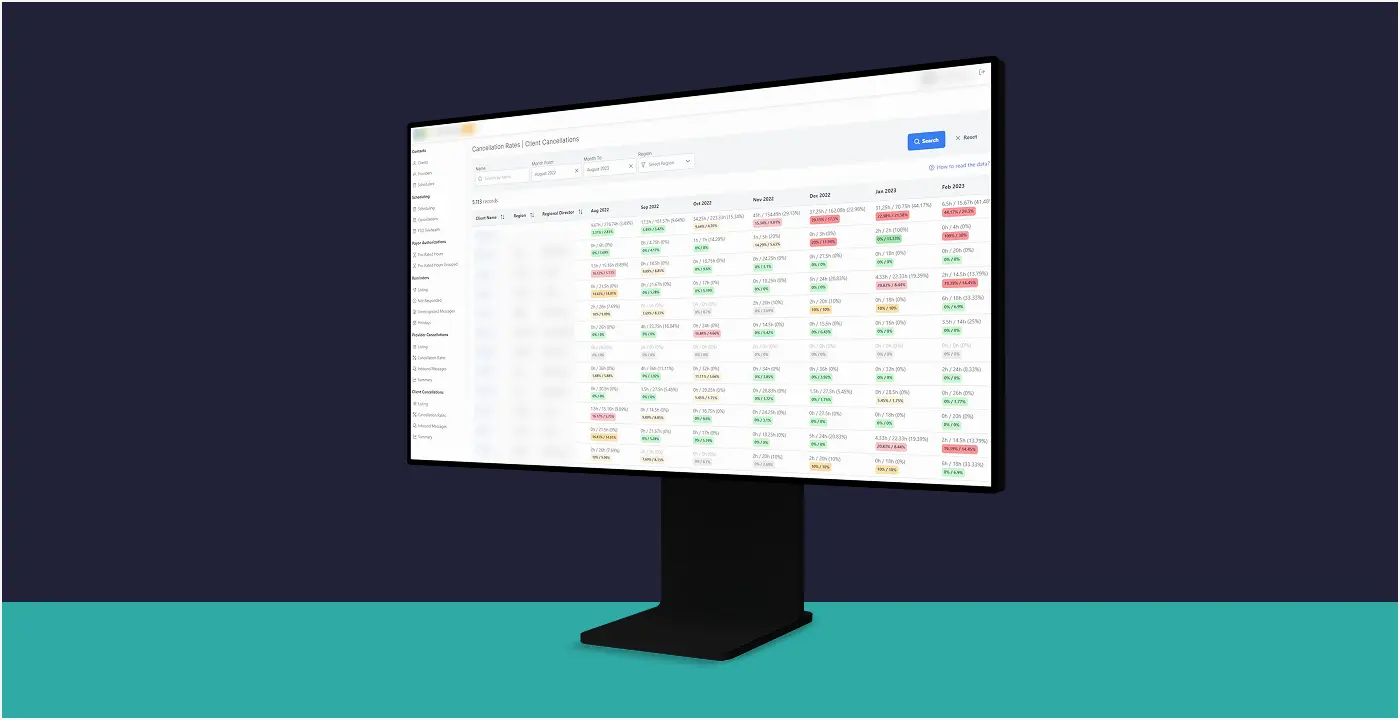
Founded: 2012
Headquarters: Pasadena, CA, United States
For more than a decade, this telemedicine software development agency has been an innovator in healthcare technology, with the strong support of management services organizations (MSOs), applied behavioral analysts (ABAs), third-party administrators (TPAs) and Medicare Advantage Prescription Drug (MAPD) health plans.
Key services: Web application development, mobile app development, databases and dashboards, mobile messaging systems, CRM.
Industries: Medical, retail, business.
Why choose them:
The goal is to rid manual drudgery from care delivery, where they consider it unnecessarily tedious and to make the delivery of care smooth throughout. Moreover, they received 5-star ratings across the board by their clients on all counts: technical precision, frictionless communication, timely delivery and ability to stay on budget.
Select case studies:
Their examples of work are proof of enterprise-grade builds that elevated clinical and administrative workflows significantly, some of which were completed in less than 90 days without disruption.
Kanda Software

Founded: 1993
Headquarters: Newton, MA, United States
In the past 25 years, Kanda Software has completed over 2,000 custom projects for a wide spectrum of clients ranging from nimble startups to Fortune 500 corporations. Their telemedicine development services made a mark by introducing AI into the clinical loop, creating a cancer-therapy platform, thereby improving both treatment outcomes and commercial profits.
Key services: Custom software development, product engineering, UI/UX design, DevOps, data and analytics, AI and ML.
Industries: Healthcare, life sciences, adtech, martech, real estate, fintech, nonprofit organizations.
Why choose them:
Kanda functions like a reliable extension of your team with US-based delivery managers and bulletproof execution mechanisms: on time, within budget, with full IP protection baked in. They are also recognized for accelerating time-to-market without compromising on quality through their agile, collaborative approach.
Select case studies:
In medicine, their catalogue of works includes supporting a global telehealth and patient care portal used by more than 18 million people, keeping all systems working while complying with HIPAA and FDA in all code and back-end processes.
Apzumi
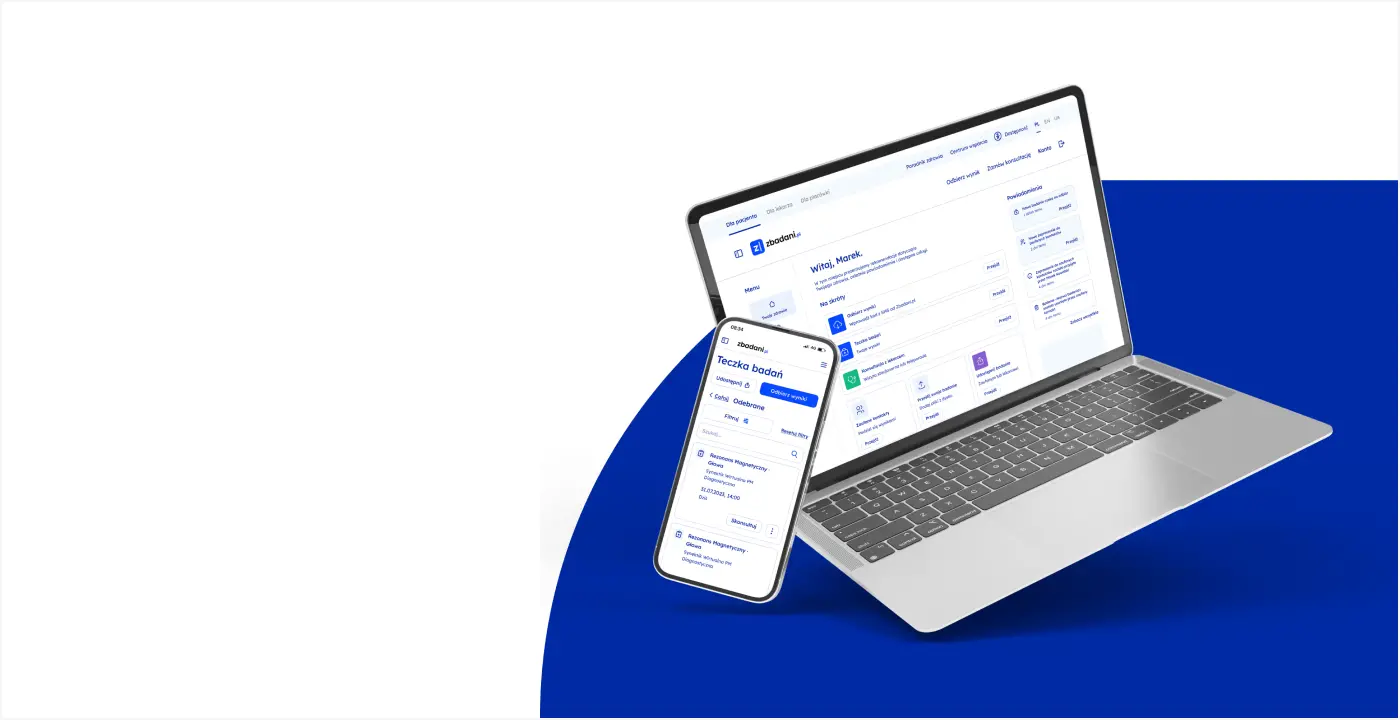
Founded: 2013
Headquarters: Poznań, Poland
Apzumi is a telehealth software development agency that has offerings from implementation and support to building remote patient monitoring setups and telemedicine companion applications. Further, the firm ranked number 88 on the Fastest Growing Companies list in Europe of the Financial Times for the year 2024 and has various badges.
Key services: Mobile development, custom software development, AR application development, product design.
Industries: Healthcare, marketing.
Why choose them:
Deep medical domain experience and technical firepower set it apart in that they develop platforms that not only run successfully but also heal, as well, producing custom-made secure digital health solutions with delivery towards actual patient outcomes.
Select case studies:
For example, among their success stories you can see AI-powered systems used to cut through clinical noise: across intelligent medical documentation tools, a digital place that keeps cardiac rehab alive and AR-enabled pharmaceutical sales aids that put the laboratory in one’s hand.
BGO Software

Founded: 2008
Headquarters: London, United Kingdom
BGO Software has served more than 70 clients with over 120 projects, including the UK Department of Health (NHS), Roche, LabCorp and IQVIA. From a healthcare perspective, this telehealth software development firm stands out as one of the few global firms that bring both knowledge and relevant skills, combining deep expertise with full regulatory compliance.
Key services: Custom software development, application management and support, IT managed services, IT strategy consulting, IoT development, mobile app development.
Industries: Medical.
Why choose them:
They offer a rare blend of strategic tech leadership, agile product delivery and following of statutory rules, hitting the right spot between innovation and law to ensure high-quality healthcare software that’s delivered on time, on spec and on budget.
Select case studies:
Their track record features producing systems that operate smoothly and efficiently in the areas of clinical trial management platforms for Tokuda Clinical Research Center and GMP-compliant manufacturing intelligence systems for pharmaceutical companies.
IT Medical
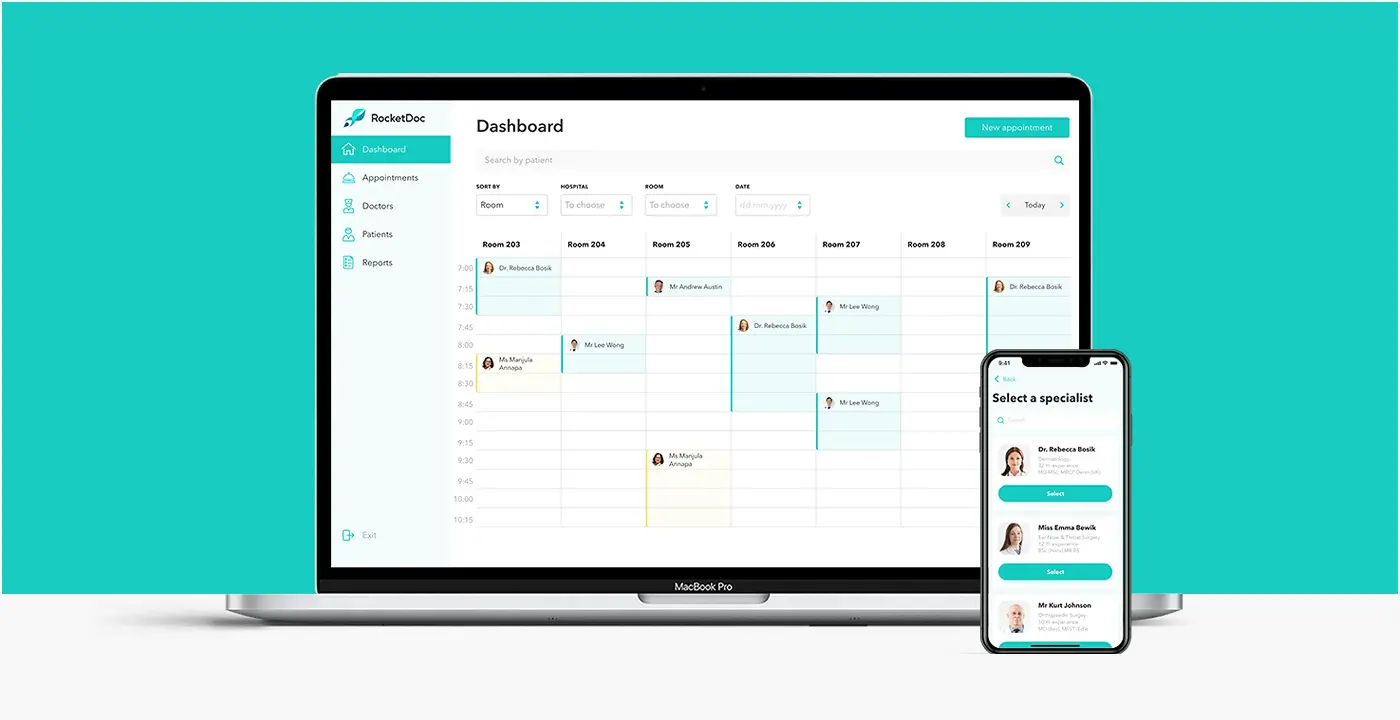
Founded: 2015
Headquarters: London, United Kingdom
IT Medical is spread across the globe and works as one of the reliable telehealth development companies with nearly 50 in-house experts specialized in engineering, healthcare and natural sciences, nearly all of them with either a BS, MSc, or PhD. Their solutions helped hospitals grow operations with a focus on more than 23,000 yearly patient cases.
Key services: Software engineering, digital product consulting, DevOps, QA and testing.
Industries: Medical, dental.
Why choose them:
Fast number crunching with AI tools helped put diagnosis times down by 42%, while cloud telemedicine portals made sure the pipeline stayed smooth, with appointment no-shows down by a streak of more than 23%.
Select case studies:
In 2026, IT Medical was recognized by Forbes, The Manifest and DesignRush as among the leading firms in IT services, AI and software engineering. So feel free to take a look at their case studies to understand their approach and influence.
What is a telehealth software development company?
Healthcare software development companies specialize in building platforms that facilitate remote patient care. Such firms actually create the telemedicine infrastructure of modern-day systems where doctors and patients contact each other online over video consultations, integrate electronic health records, schedule appointments and prescriptions.
Given the fact that such software deals with the privacy and security of medical data, they cannot afford to build an insecure system and so they highly stress complying with regulations such as HIPAA or GDPR.
An interesting note is that the worldwide telemedicine market was valued at approximately USD 141.19 billion in 2024 and is expected to grow to around USD 380.33 billion by 2030, as stated in Grand View Research, making it a very promising field to start investing in.
With healthcare knowledge and the latest technology such as WebRTC, cloud infrastructure and AI at their disposal, these suppliers ensure the medical professionals are staying ahead of the curve and keeping the availability of care within arm’s reach despite physical location.
Types of companies in the telehealth market
The telemedicine domain includes firms offering solutions based on various healthcare needs and organizational sizes. Knowing the types of suppliers helps choose the right partner to improve patient care.

- Independent telehealth platform developers
They build standalone telemedicine platforms from scratch, emphasizing intuitive interfaces, seamless video consultations and efficient patient management. They focus on scalable and customizable solutions adaptable to different healthcare workflows. Their work includes providing updates and new features continuously to stay on top of technological trends.
- Specialty telehealth software providers
Such telehealth software development companies offer specific programs targeted to various medical fields, such as mental health, dermatology, or chronic disease management. They produce more in the way of functional tools for niche usage, including those related to regulatory compliance and workflows particular to specialized care.
- Enterprise telehealth solution firms
These vendors for hospitals and larger healthcare networks supply platforms that act as an ecosystem with integrations of existing systems of EHRs. The process focuses on guaranteeing security, interoperability and multi-user management for large-scale operations.
They also provide support and training services for smooth acceptance into complex organizations.
- Remote monitoring & IoT integration agencies
The main focus here is writing software programs that track patient data on a real-time basis, which can then be analyzed to offer actionable insights, alerts, or predictive analytics for proactive patient care. Their unique solutions help healthcare suppliers to minimize hospital readmissions and better manage all the medical records.
- Hybrid Cloud & SaaS telehealth suppliers
Platforms of telemedicine software development companies of this caliber allow flexible deployment and also cross-device access and automatic updates, reducing IT overhead while enabling rapid scaling. While assuring reliability and data security, they relieve the providers from infrastructure worries so that they may concentrate on expanding their services.
Comparing telemedicine software development companies
You have already seen our list of the most prominent vendors nowadays, which is why we offer you a comparison of them according to the criteria everyone thinks of every time while choosing a service supplier of any kind.
Experience
An expertise in telemedicine indicates how well familiar it is with the complexities of the healthcare solutions, associated regulations and patient needs, including clinical workflows. It is always nice to opt for someone with 7+ years of expertise, but for something simpler, you can work with less experienced suppliers.
The US and UK software development companies, as well as worldwide representatives, tend to foresee common challenges and prepare something that really works for medical settings.
If you need something basic, there is practically no difference between options, but if we talk about a project that is complex and feature-packed, senior providers are your go-to option.
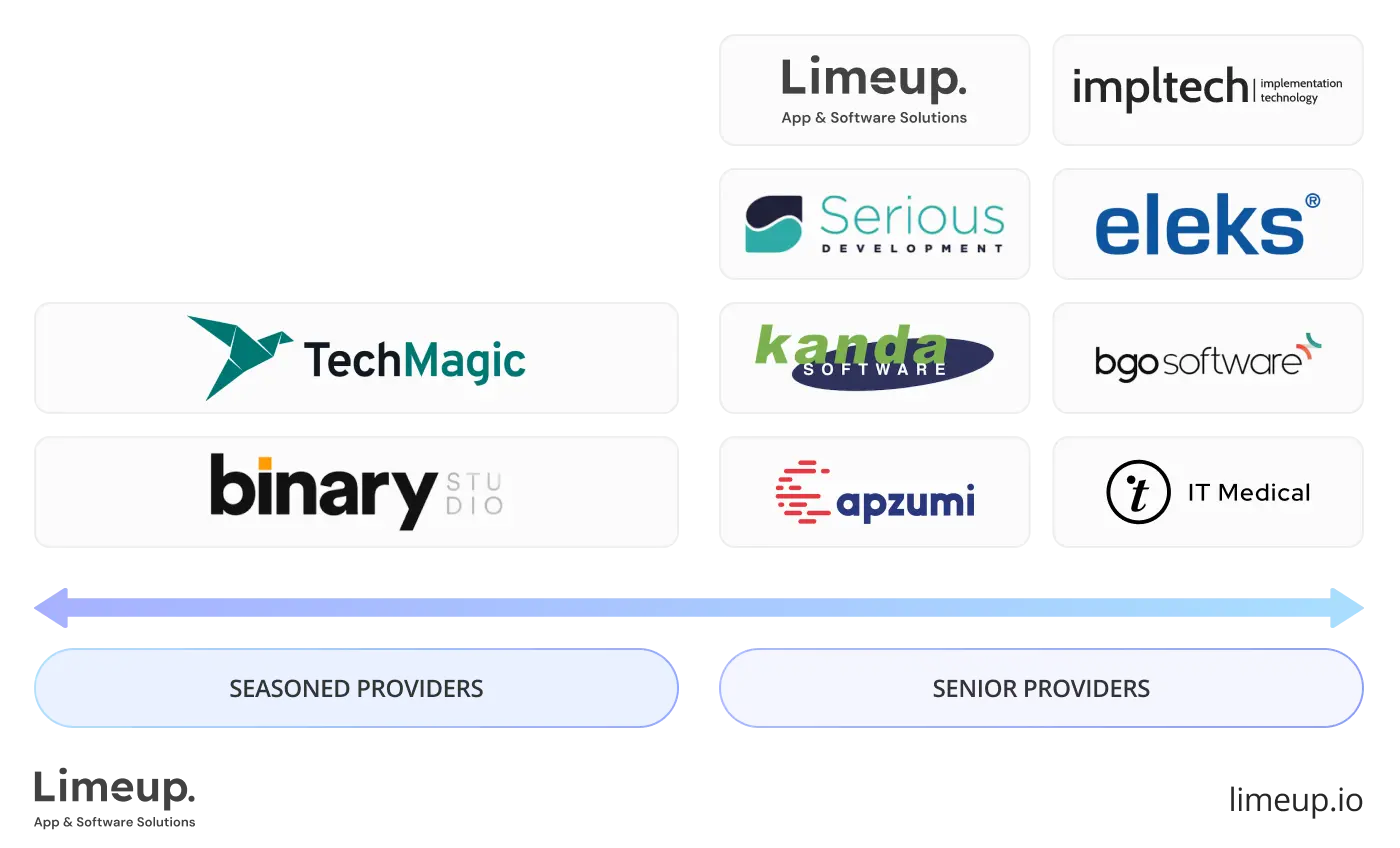
Team size
The size of the telehealth software development company dictates how quickly and efficiently it can create and scale up a telehealth product. Usually, larger teams have the luxury of working with specialists in design, coding, testing and deployment, who assist in possibly speeding up the process and covering diverse areas.
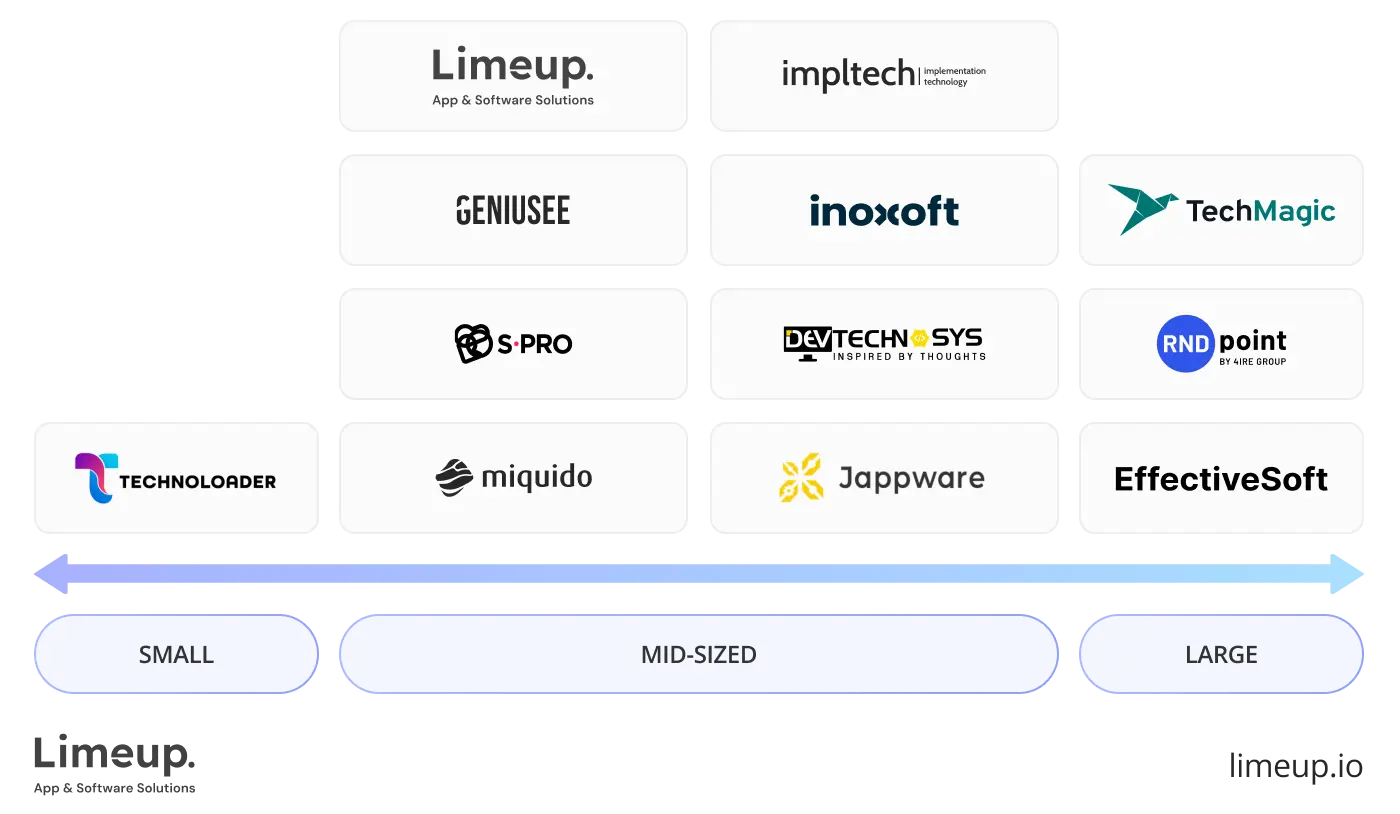
Pricing
A transparent fee structure means clear estimates of telemedicine software development services and no unnecessary expenditures on someone else’s account. On their end, this results in having a realistic expectation of the subsequent expenses and being able to compare offers presented by other companies.
At its very core, pricing can be defined as the interplay of quality, know-how and possible underpriced products that fulfill your needs. For example, it will be less costly to hire a dedicated developer in comparison with a large-scale cross-organization collaboration, but you should understand that both options have their advantages and disadvantages.
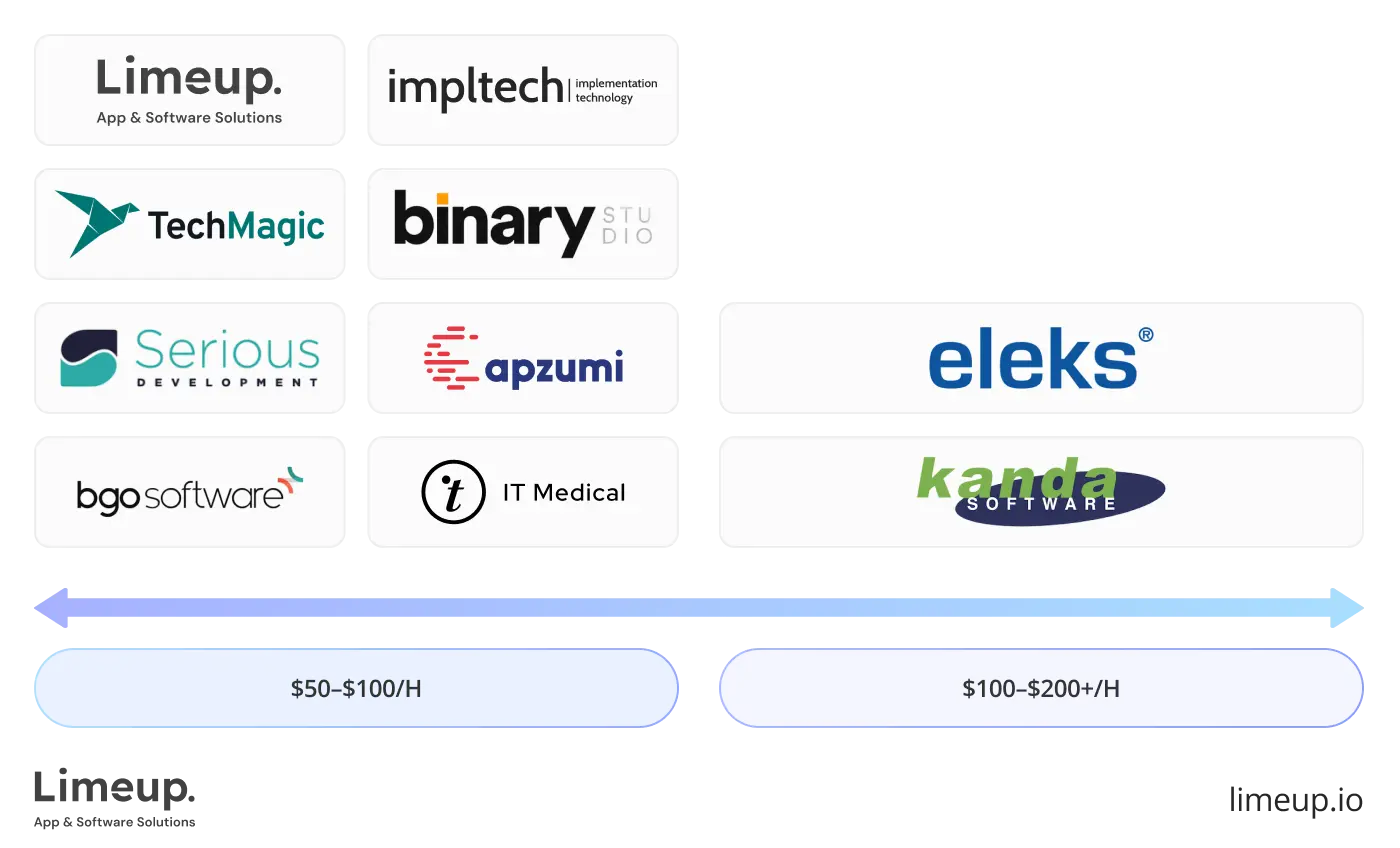
While choosing among telehealth software development agencies, everything ultimately rests in your hands, whatever priorities, standards and long-term goals you decide to go with.
When you’re evaluating potential vendors or crafting a fine future-proof product from the ground up, it’s paramount to find a partner that does not simply check the boxes but also serves as a beacon for excellence, reliability and a pain-free working relationship.
How to select a telemedicine software provider?
Previously, we have covered partially this subtopic by mentioning a couple of details that are influential during your search and thus collaboration, but what about more complex specifics? In this part of our review, you will find everything you need to know in order to begin fruitful cooperation with a contractor that fits your needs 100%.
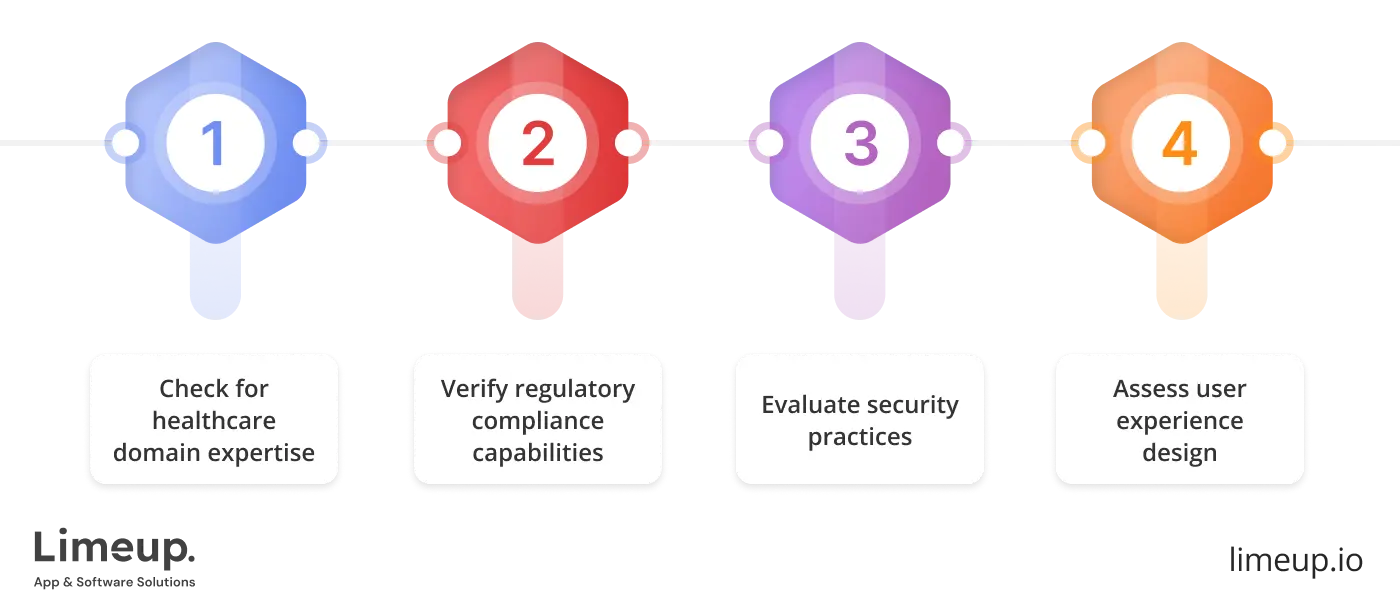
- Check for healthcare domain expertise
Begin by examining if telehealth software development companies have proficiency strictly in this realm. They should know exactly what clinical workflows are, medical terminologies and the pressing needs of healthcare providers and patients.
Any reverberations in projects on electronic health records, remote monitoring tools, or teleconsultation platforms will be helpful — the last indication of adding weight in digital medical treatment.
- Verify regulatory compliance capabilities
To build a telehealth solution, a software company in the UK or from other parts of the world must follow specific healthcare regulations, from HIPAA to GDPR or local equivalents. Ask how they ensure compliance during engineering, deployment and data handling.
An excellent vendor knows all boxes on compliance are checked and audits security and their documentation process is second nature to them.
- Evaluate security practices
Personal patient data should be targeted for protection at every stage. Make sure telemedicine software development agencies are using best practices, e.g., end-to-end encryption, a secure cloud infrastructure and penetration testing on a regular basis.
Please keep in mind that they also have to apply a role-based access control framework and prepare a breach response plan that is ready for deployment at the first sight of trouble with security.
- Assess user experience design
A user-friendly design is, by nature, simple for both patients and medical providers; hence, it minimizes any learning curve. Find out if any UX specialists are working in the company you are opting for and whether they conduct user testing?
In conclusion, the essence of selecting the right telehealth partner lies in finding a team that not only delivers technology but also embraces the vision of transforming care delivery. A truly valuable collaboration is built on trust, shared goals, and the ability to innovate in ways that genuinely improve lives.
How much do telemedicine software development services cost?
There is a huge variety of different factors that can drive the price up, or on the other hand, make all the fees smaller. But what are these features and for what is it more appropriate to opt for you in order to reach the best result product-wise and not waste money on something you or users do not really need right now?
According to research by the World Health Organization, telemedicine is present in the lives of citizens of 84% of European countries. We will show you how to take part in this digitalization process without emptying your pockets, by understanding what you are going to pay.
| Project type | Key features | Estimated cost |
| Basic MVP | Video calling, text-based chat, appointment booking, simple user registration/login, based on web or mobile, basic admin panel. | $20,000–$40,000 |
| Standard telehealth app | Video + voice calls, chat, appointment scheduling, multi-platform (web + mobile), patient and doctor profiles, calendar integration. | $80,000–$120,000 |
| Mid-range portal | Multi-role system (doctor, patient, admin), EHR and payment gateway integration, push notifications, secure messaging, mobile + web apps. | $120,000–$180,000 |
| Advanced telehealth suite | AI-driven triage or diagnostics, wearable/IoT integration, role-based dashboards, real-time analytics, multi-language support. | $180,000–$250,000 |
| Enterprise-grade solution | Full-scale HIPAA/GDPR compliant architecture, custom UI/UX, third-party system integration (labs, pharmacies), scalability for thousands of users. | $250,000–$300,000+ |
Hidden costs to consider in telemedicine projects
Regulatory compliance — ensuring your platform meets HIPAA, GDPR, or local healthcare regulations often requires extra effort, legal vetting and certification audits. These aren’t just checkboxes — they’re the guardrails that keep you on the right side of the law.

- Additional Fees: $10,000–$50,000+
Third-party services — might include monthly or best usage fees for video calling via APIs, processing payment APIs, or EHR APIs that can become exorbitant behind the scenes. Be mindful to include these components in your long-term cost considerations while working with telehealth software development firms or trying to hire software developers.
- Additional Fees: $500–$10,000+ annually
Cloud infrastructure — covers continuous costs for hosting storage, bandwidth and deployment environment on a scalable portal such as AWS or Azure. Being flexible has a price tag with the Cloud, where you are essentially renting a runway for your app to take off.
- Additional Fees: $200–$2,000+ per month
Security measures — like advanced considerations of penetration testing, real-time monitoring and encrypted communication serve as a protective shield for your system and are always implemented. These features, however, also add a heavy price tag to your technology stack in both upfront and long-term expenses.
- Additional Fees: $5,000–$30,000+ initially
Data storage & backups — SaaS software development companies implement secure storage and reserve solutions for medical data, keeping it encrypted and redundant in compliance with retention laws. These copies act as a safety net, ready to protect your data if the unexpected happens.
- Additional Fees: $0.05–$0.25 per GB/month
Maintenance & support — the post-launch team plugs in for regular updates, performance tuning, bug fixes and any other emergencies that arise, working to keep the wheels turning smoothly. This is not an area in which you can just “set it and forget it,” as ongoing maintenance by telemedicine software development firms figures into the cost of staying relevant.
- Additional Fees: 15%–25% of the initial development cost annually
Role-specific customization — tailoring dashboards and workflows for patients, doctors and administrators will mean creating separate control towers in the same system. In other words, role-based features, for example, from a bespoke software development company, not only improve usability but also keep every user in their own lane for maximum efficiency and safety.
- Additional Fees: $5,000–$30,000+
To sum everything up, it is essential to understand that accurate budget estimation plays a crucial role in every stage of eHealth solution creation. Your main objective should be to clearly define your needs from the outset and envision how the system should scale in the future, not to waste your money on something minor and non-beneficial.
Ultimately, a well-structured financial plan ensures smoother execution and long-term sustainability.
Why choose Limeup for your healthcare project?
For more than ten years, Limeup has been at the forefront of creating cutting-edge solutions, serving healthcare providers in the UK, the US and a wide range of international markets. The work of our telemedicine software development company supports clinics and hospitals that want to connect patients and practitioners through seamless platforms.
What we deliver:
- Bespoke telehealth applications
- Straightforward pricing without hidden extras
- Comprehensive guidance throughout the project
- Compliance-focused, future-proof infrastructure
Our portfolio spans from AI-powered mobile health apps to large-scale telehealth ecosystems designed to operate without interruption and meet the strictest regulatory demands. For example, one of our partners, Apontis — a leading medicines search and prescription platform, saw a 45% reduction in search errors after receiving a custom web app.
The system also achieved 99.99% uptime, reduced manual report creation by 80% and handled thousands of prescription lookups daily, ensuring smooth operation and an accurate, user-friendly experience for both patients and doctors.
Searching for telemedicine software solutions?
In this article, we have covered a lot of useful details and valuable insights and we hope that every piece of information mentioned will guide you to new heights and you will find a reliable partner to collaborate with. But if you are still not sure, we have something more.
At Limeup, we are always ready to help you, whether you need some more clarification regarding this topic or you want to start working with us on your project. Our specialists will offer you deep technical and compliance knowledge, support and market understanding to make your product shine bright like a diamond. Contact Limeup, and let’s begin your tech journey!
Telemedicine development company FAQ
What services do these companies offer?
Telemedicine software development firms design and create digital tools that bring healthcare solutions online, making it easier for patients and providers to connect without barriers of distance. Their work combines medical knowledge, secure systems and modern technology to create user-friendly platforms.
Key services include:
- Virtual care features — video consultations, secure chat, scheduling and e-prescriptions.
- System integration — seamless connection with EHRs and hospital software.
- AI-driven tools — symptom checkers and triage systems.
- Remote monitoring — IoT-enabled tracking of vital signs and chronic conditions.
- Compliance & security — adherence to local and global regulations.
These companies make remote care practical, safe and accessible, ensuring patients can reach medical professionals whenever they need help.
What are the benefits of partnering with telemedicine software companies?
Healthcare is undergoing a major shift as modern telemedicine development companies introduce innovative platforms that bridge the gap between patients and providers. These solutions ensure seamless medical interactions, breaking traditional barriers of distance and time while creating more efficient, scalable and patient-friendly systems.
The following benefits of such a partnership are:
- Secure consultations
- Remote monitoring
- Integrated systems
- Enhanced accessibility
- Wide data coverage
Ultimately, these mean patients getting easier access to some medical expertise and consistent care. Healthcare suppliers know it should scale, comply and be customized. To summarize, such collaborations empower user engagement and consequently make healthcare systems adaptable and ready for the future.
What is the average duration of a telehealth development project?
Virtual healthcare solutions are, in any case, highly complex ventures where timelines vary with their features, complexity and a telemedicine software provider. Simple computer applications for basic video consultations, appointment scheduling and messaging take 3–4 months.
Medium-difficulty projects require between 6 and 9 months to complete because of HIPAA or GDPR requirements. They also include EHR integration, secure payments and patient portals.
Complex telehealth platforms with AI diagnostics, remote monitoring, IoT device integration and multi-layer security can take 9–15 months or longer. Lengthy testing, successive and iterative design update cycles and regulatory approval processes extend the duration.
What post-launch services can you expect?
While working with a digital products supplier to build a telemedicine solution, support, among other telehealth software development services, is needed so the app maintains good performance, protection and user experience.
It generally consists of:
Bug fixes & performance optimization
Feature enhancements & updates
Security & compliance maintenance
User support & monitoring
Infrastructure & server upkeep
The continued professional care of your eHealth project must be invested in, based on what you can get. This maintains efficacy in use, thereby instilling confidence among patients and providers about the platform while offering a much-needed dose of sustainable growth to a competing digital healthcare market.
What challenges can arise when working with these providers?
Sometimes, a roadblock can appear in the process of collaboration with telehealth software vendors. These complexities, often needing careful attention and a proactive approach, should be managed together so that the partnership stays on course.
- Misalignment of expectations — differing visions between client and provider.
- Regulatory compliance risks — failure to meet HIPAA, GDPR, or local healthcare laws.
- Integration difficulties — problems connecting with EHRs, hospital systems, or APIs.
- Communication gaps — misunderstandings due to time zones, language, or unclear processes.
- Scalability and performance issues — underestimating technical demands or user load.
By considering these issues, a better-informed cooperation can be established, leaving no room for surprises. Many of these potential stumbling blocks can, with careful planning and constructive communication, be turned into avenues for closer collaboration.


